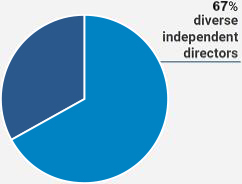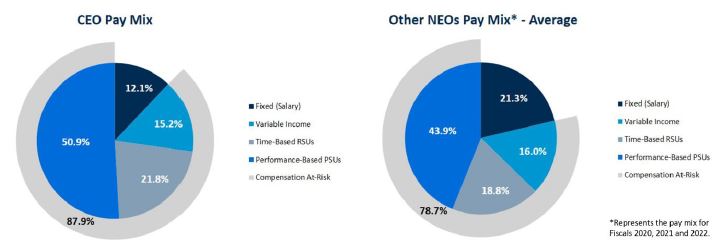such offer of resignation and will consider such factors and circumstances as it may deem relevant, and, within 90 days following the final certification of the election results, will make a recommendation to the Board concerning the acceptance or rejection of such tendered offer of resignation. The policy requires the decision of the Board to be promptly publicly disclosed.
Board Diversity Policy
In October 2020, our Board adopted a Board Diversity Policy. The purpose of this policy is to set out the basic principles to be followed to ensure that the Board has the appropriate balance of skills, experience and diversity of perspectives necessary to enhance the effectiveness of the Board and to maintain the highest standards of corporate governance. Pursuant to this policy, selection of Board candidates will be based on a range of perspectives with reference to the Company’s business model and specific needs, including, but not limited to, talents, skills and expertise, industry experience, professional experience, gender, age, race, language, cultural background, educational background and other similar characteristics.
Anti-Hedging Policy
The Company believes it is improper and inappropriate for our directors, officers, employees and certain of their family members (each, a “Subject Person”) to engage in hedging, short-term or speculative transactions involving the Company’s securities. Our anti-hedging policy, which we further strengthened during Fiscal 2019, applies to all Subject Persons. The Company prohibits Subject Persons from engaging in (i) derivative, speculative, hedging or monetization transactions in Company securities (including, but not limited to, any trading on derivatives (such as swaps, forwards and/or futures) of Company securities that allow a stockholder to lock in the value of Company securities in exchange for all or part of the potential upside appreciation in the value of such stock), (ii) short sales (i.e., selling stock the Subject Person does not own and borrowing shares to make delivery) or (iii) buying or selling puts, calls, options or other derivatives in respect of Company securities.
Anti-Pledging Policy
In addition, the Company believes it is improper and inappropriate for any Subject Person to engage in pledging transactions involving the Company’s securities. During Fiscal 2019, we adopted a robust anti-pledging policy, which prohibits Subject Persons from pledging or encumbering Company securities as collateral for a loan or other indebtedness. This prohibition includes, but is not limited to, holding such shares in a margin account as collateral for a margin loan or borrowing against Company securities on margin. Any pledges (and any modifications or replacements of such pledges) that existed prior to the adoption of our policy are grandfathered unless otherwise prohibited by applicable law or Company policy and so long as any modification or replacement of any pre-existing pledge does not result in additional shares being pledged.
Securities Trading Policy
Our Company believes that it is appropriate to monitor and prohibit certain trading in the securities of our Company. Accordingly, trading of the Company’s securities by directors, executive officers and certain other employees who are so designated by the office of the Company’s General Counsel is subject to trading period limitations or must be conducted in accordance with a previously established trading plan that meets SEC requirements. At all times, including during approved trading periods, directors, executive officers and certain other employees notified by the office of the Company’s General Counsel are required to obtain preclearance from the Company’s General Counsel or his designee prior to entering into any transactions in Company securities, unless those transactions occur in accordance with a previously established trading plan that meets SEC requirements.
Transactions subject to our securities trading policy include, among others, purchases and sales of Company stock, bonds, options, puts and calls, derivative securities based on securities of the Company, gifts of Company securities, contributions of Company securities to a trust, sales of Company stock acquired upon the exercise of stock options, broker-assisted cashless exercises of stock options, market sales to raise cash to fund the exercise of stock options and trades in Company’s stock made under an employee benefit plan.
Stock Ownership Guidelines
Our Board believes that our directors, named executive officers (“NEOs”) and certain of the Company’s other officers and employees should own and hold Company common stock to further align their interests with the interests of stockholders and to further promote the Company’s commitment to sound corporate governance.
16



